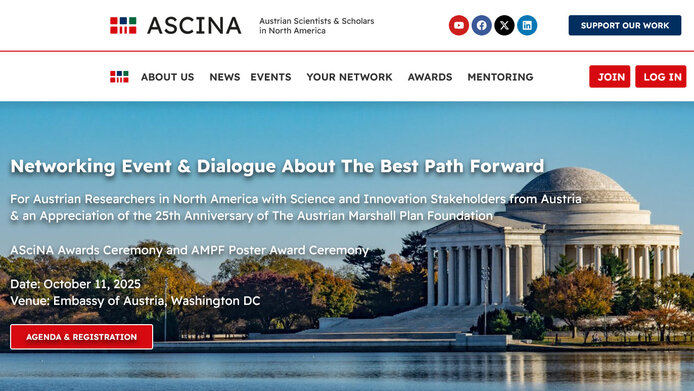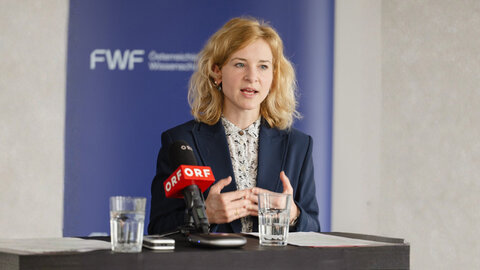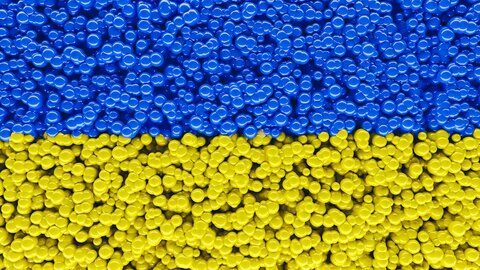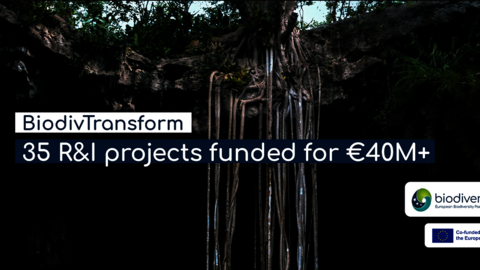Awards for Outstanding Austrian Researchers in the USA

Researchers Caroline Moosmüller, Alexander Lercher, and Gabriele Wadlig were honored for their excellent publications with this year's ASciNA Awards of the Federal Ministry of Women, Science and Research during a networking event for Austrian researchers at the Austrian Embassy in Washington, D.C., on October 11, 2025.
“With the ASciNA Awards, my ministry honors excellent Austrian researchers in North America and at the same time supports the global networking of Austrian research. Especially now, when science and research in the USA are subject to increasing pressure, it is important to bring Austrian researchers to the fore and encourage them in their work. In times of multiple crises, global cooperation and international mobility must continue. At the same time, however, we support those who need a safe haven – that is Austria as a research location for talented researchers who bring their experience to us from abroad,” said Federal Minister Eva-Maria Holzleitner.
The ASciNA Awards, endowed with €10,000 for the main prize in the Junior Principal Investigator category and €7,500 each for two Young Scientist awards, are presented to early-stage researchers from Austria for outstanding scientific publications. The prize is awarded for work resulting from a research stay in North America and published in renowned journals. The award winners are selected by an international jury of the Austrian Science Fund (FWF).
“For more than two decades, ASciNA has been a platform for supporting young researchers in their scientific development – a goal that is also strongly supported by the Austrian Science Fund (FWF). We are delighted to support the awards every year by administering the review process,” says FWF President Christof Gattringer. “In view of the latest research policy developments in the USA, it is important to uphold the spirit of cooperation and the international exchange of knowledge – these award-winning publications contribute to this goal. I would like to congratulate the award winners Caroline Moosmüller, Alexander Lercher, and Gabriele Wadlig and wish them continued success in their research careers,” said FWF President Christof Gattringer.
Mathematics, immunology, and law
Caroline Moosmüller receives this year's main prize for her excellent publication “Linearized Wasserstein dimensionality reduction with approximation guarantees” (Applied and Computational Harmonic Analysis, October 2024). An assistant professor at the University of North Carolina at Chapel Hill’s Department of Mathematics, Moosmüller is head of the Geometric Data Analysis research group. Previously, she has held positions as a Visiting Assistant Professor at the University of California, San Diego, and as a postdoctoral fellow at Johns Hopkins University. She obtained her doctorate from Graz University of Technology in 2017. Her work deals with the interpretation of complex data, which require methods that can reliably recognize patterns and structures to make them understandable. Traditional machine learning methods are reaching their limits, especially with high-dimensional data such as images, texts, or genetic measurements. In response, her research team has developed the LOT Wassmap method. It combines modern mathematical approaches to optimal transport with proven methods for dimension reduction and is particularly suitable for point clouds and distributions. A decisive advantage: LOT Wassmap remains stable even with incorrect measurements and delivers robust results. The method has been successfully tested on artificial data sets and is now being applied to gene expression data from cancer patients. The aim is to differentiate between types of cancer more precisely and to better understand their biological basis – an important step towards improving diagnosis and treatment options.
Alexander Lercher and Gabriele Wadlig were both honored in the Young Scientist category.
Alexander Lercher is a postdoctoral researcher at Rockefeller University in New York, and works in the laboratory of Nobel laureate Charles M. Rice. His research focuses on the question of how the innate immune system can develop a “memory” that not only protects against known viruses, but also against new ones – a promising approach in the fight against future pandemics. After studying molecular immunology and microbiology at the University of Vienna, Lercher completed his doctorate at the Medical University of Vienna’s CeMM Research Center for Molecular Medicine in 2020. In his publication “Antiviral innate immune memory in alveolar macrophages following SARS-CoV-2 infection ameliorates secondary influenza A virus disease” (Immunity, November 2024), Alexander Lercher and his co-authors found that the innate immune system is capable of forming a functional memory. In a SARS-CoV-2 mouse model, the researchers were able to show that alveolar macrophages – key immune cells in the lungs – are epigenetically reprogrammed by the activity of type I interferons, leading them to develop an increased antiviral response. Remarkably, this reprogramming led to increased protection against subsequent infection with an antigenically foreign influenza virus. These results show that the innate immune memory can offer broader, cross-pathogen protection than previously assumed. The researchers’ detailed explanation of the underlying molecular mechanisms opens up new perspectives for the development of broadly effective antiviral therapies and could make a significant contribution to pandemic prevention.
Gabriele Wadlig is a postdoctoral researcher in the field of legal and constitutional theory at Dresden University of Technology. Her research focuses on questions of global governance in the space between nature, technology, and infrastructure, as well as on the complex interactions of legal and non-legal governance technologies. She received her doctorate in the Juridical Science Program at New York University School of Law on the topic of tenure security in international law. Wadlig studied law at the University of Graz, has a joint master’s degree in Sustainable Development (Venice/Graz/Leipzig), and a bachelor’s degree in Economics and Social Sciences from the Vienna University of Economics and Business. In her publication “The International Law of Land (Grabbing): Human Rights and Development in the Context of Racial Capitalism" (Chicago Journal of International Law, February 2025), Wadlig analyzes how international and transnational legal structures shape global land policy and what consequences this has for local populations. The focus is on the concept of tenure security, i.e., the legal protection of land use and ownership rights, which is seen as the key to poverty reduction, food security, and sustainable development. Wadlig shows that international programs often equate tenure security with the formal registration and transferability of land rights, which often leads to the opposite effect: Land is primarily seen as a tradable asset, which puts indigenous communities in particular at a disadvantage, for example through expropriation, displacement, and the loss of livelihoods. Wadlig demonstrates that these dynamics can be traced back to colonial path dependencies in which land was primarily understood as a resource for economic exploitation. Her paper calls for a decolonial reflection on international legal practices and emphasizes that land must be recognized not only as property, but also as a basis for livelihoods, a cultural space, and a common good. This is the only way to create fair and sustainable approaches to development work and human rights protection that reduce structural inequalities.
Connecting Austria’s science system with the North American research area
This year’s ASciNA Awards showcase the creativity, diversity, and international success of Austrian research. “The ASciNA award winners’ research proves that science does not happen in an ivory tower, but provides real-life answers to today’s most pressing challenges to human health, the environment, and society. From innovative approaches in immunology to critical analyses of global legal structures and new methods of data analysis – our award winners combine excellent basic research with high social relevance. ASciNA is proud to introduce these outstanding talents. We would like to thank the Federal Ministry of Women, Science and Research and the FWF for their essential and long-standing support of our researchers in North America,” says ASciNA President Alexandra Lieben.
ASciNA, a network of Austrian researchers in North America, was founded in Washington, D.C., in 2002 and has around 1,400 members worldwide. ASciNA is committed to its members in North America, but also builds bridges between Austria and North America and acts as an interface between Austria’s science system and the North American research area. In addition to the ASciNA Awards, the network’s main activities include the ASciNA Mentoring Program, Virtual ASciNA Talks, local networking within the ASciNA chapters in the US, Canada, and Mexico, and raising awareness of and mobilizing the Austrian scientific diaspora.





